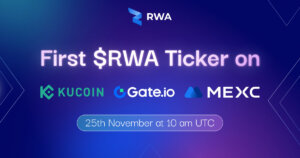RChain Demonstrates Scalable Blockchain With Audio-On-Chain
Photo by James Owen on Unsplash
Third-generation smart contract platforms are seeking to improve upon the inefficiencies of derivative blockchains. On Sept. 6, RChain showcased its blockchain at internet-scale through an audio-on-chain demonstration.
Immersive Audio on Blockchain
Third-generation blockchain cooperative RChain provided a glimpse into a blockchain at internet-scale during its developer conference in Berlin, according to a press release.
By running the decentralized application (dApp) RSong, the RChain testnet exhibited high-volume performance at scale. RChain partnered with Immersion Networks, Resonate and Mycelia to demonstrate the ability to store immersive audio on a blockchain.
Founded in 2014, Immersion Networks is a research and development firm working toward innovating new technology to improve the human listening experience. In the press release, Paul Hubert, founder of Immersion Networks, said:
“You need to hear our immersive platform to understand just how profoundly different the experience is. This platform can be experienced on the standard stereo headphones you already own.”
Several competing smart contract platforms still struggle with issues surrounding scalability. Last year, Ethereum’s mainnet became severely congested after CryptoKitties, a decentralized crypto collectibles game, gained popularity among users.
Aiming for unlimited scalability, RChain founder Greg Meredith hopes to achieve a blockchain that can support “Visa level transaction speeds and Facebook levels of data.” The platform is further developing a more efficient, categorized cost model for blockchain transaction costs, called “Phlogiston.”

While other blockchain operating systems charge users equally for computing and network resources, Phlogiston separates costs by computing, network, storage and memory usage. This revised cost model allows users to pay for their exact usage.
RChain also plans to integrate identity-layer solution LifeID into its mainnet to give users control over their digital identity.
LifeID will launch on the Ethereum blockchain and RChain testnet but plans to migrate fully to the RChain mainnet in the future. Due to the scalability benefits, LifeID decided to build its long-term infrastructure on RChain’s third-generation smart contract platform with higher transaction speeds and throughput.
Through advancements in scalability, affordable transaction costs and security, RChain is well-poised to become a viable third-generation blockchain. RChain will hold its official mainnet launch in Q1 2019.



 Farside Investors
Farside Investors 


 CoinGlass
CoinGlass 

























































































